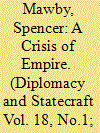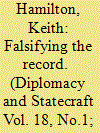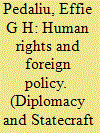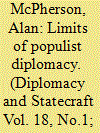| Srl | Item |
| 1 |
ID:
076731


|
|
|
|
|
| Publication |
2007.
|
| Summary/Abstract |
The crises which accompanied the rise and decline of the European empires have not been the object of systematic study in the manner of superpower crises of the Cold War period. Many of the techniques used to study Cold War crises have broader scope, including the models of governmental politics and organisational process developed by Graham Allison. The application of the Allison models to the events surrounding the delimitation of the Aden frontier between 1901 and 1905 illuminates significant aspects of the Anglo-Ottoman confrontation: they explain the manner in which non-rational elements in the policy-making process transformed a relatively insignificant issue into a crisis situation. Such insights also require a detailed examination of the documentary record which in this instance reveals the discord amongst British policy-makers and the organisational imperfections of the bureaucracy. The frontier Commissioners, the Aden Resident, the Government of India, the metropolitan government in London and the embassy in Constantinople were involved in a series of factional squabbles over the Aden frontier, the resolution of which often required the coercion of the Ottomans by the deployment of warships along the Yemen coast. Coordination amongst these different elements in the bureaucracy also played a role in generating tensions between London and Constantinople. The case of the Anglo-Ottoman dispute over the Aden frontier suggests that the analysis of internal governmental politics and organisational processes can be applied successfully to crises of empire which predate the Cold War era.
|
|
|
|
|
|
|
|
|
|
|
|
|
|
|
|
| 2 |
ID:
076732


|
|
|
|
|
| Publication |
2007.
|
| Summary/Abstract |
Historians have long been aware of how a misleading error made in the compilation of the British Blue Book on the war crisis of 1914 left the Foreign Office open to German charges of doctoring its diplomatic record. But two volumes of previously uncited manuscript documents, still in the custody of the Foreign and Commonwealth Office, reveal that the reluctance of British officials to rectify their initial mistake also contributed to the falsification of the analogous French Yellow Book. This paper suggests that the resulting Anglo-French collaboration both constrained and retarded the British government's more active engagement in the debate on the origins of the Great War.
|
|
|
|
|
|
|
|
|
|
|
|
|
|
|
|
| 3 |
ID:
076733


|
|
|
|
|
| Publication |
2007.
|
| Summary/Abstract |
The military coup of 21 April 1967 brought to power a repressive dictatorship in Greece. It proceeded to deprive Greeks of their human rights and civil liberties, outraged international public opinion and strained transatlantic relations during the Cold War. The "Greek case" culminated in the withdrawal of Greece from the Council of Europe and calls for its expulsion from NATO. This article will analyse the foreign policy considerations that determined British policy towards the Greek junta during 1967 - such as Cold War realities, alliance dynamics, economic and commercial imperatives, regional instability in the Mediterranean and domestic pressures. It will look at how these factors coalesced into shaping British policy towards the Greek junta into one in which human rights had little bearing. The article will also consider the impact of the "Greek case" on the image and credibility of the Labour government of 1966-1970 and explain why vociferous anti-junta activities in London were to create such policy difficulties for the British government.
|
|
|
|
|
|
|
|
|
|
|
|
|
|
|
|
| 4 |
ID:
076734


|
|
|
|
|
| Publication |
2007.
|
| Summary/Abstract |
This article asks what lessons about diplomacy can be drawn from Fidel Castro's April 1959 trip to the United States and Canada, a trip long neglected by historians as an aberration in US-Cuban relations because of its apparent public relations success. The trip's meaning, rather, lies in the populist style Castro practiced to circumvent normal protocol, and more importantly in the failure of that populism to sway not only US foreign policy makers but also the US public. Based on comprehensive media and archival research and of interviews in Cuba and the United States, this is the first ever article-length treatment of this diplomatic visit. It helps to understand not only the US-Cuba divide that soon followed Castro's trip but also the limited potential of a populist diplomacy.
|
|
|
|
|
|
|
|
|
|
|
|
|
|
|
|
| 5 |
ID:
076730


|
|
|
|
|
| Publication |
2007.
|
| Summary/Abstract |
Pakistan faces many problems. The struggle over the country's Islamic dimension is undecided. Pakistan continues to be a hotbed of Islamic fervor. As evidenced by the frequent interruptions of civilian rule by military regimes the country is not sure which course to follow. Violence has become Pakistan's trademark. The jihadi culture is frightening. Poverty and underdevelopment are wide spread. The educational system is a mess. Integration of the different ethnicities has not been completed. Enmity characterizes the relationship to India, mistrust that to Afghanistan. Its nuclear weapons capability is looked upon with suspicion by Western countries. Fundamental changes will only be possible if Pakistan finds its way to democracy.
|
|
|
|
|
|
|
|
|
|
|
|
|
|
|
|